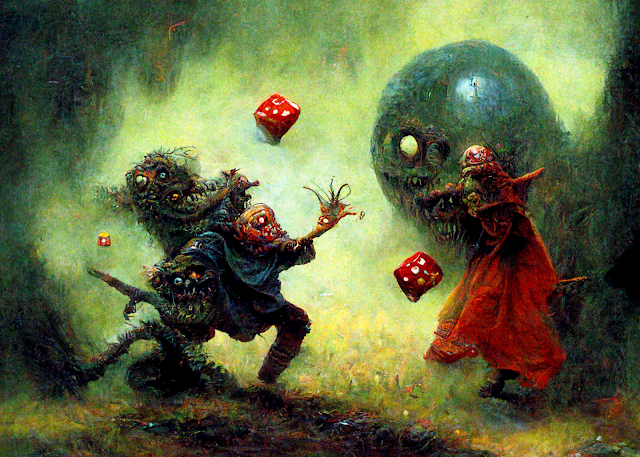This whole post might be stating the obvious, but it's something that's been bouncing around my head a bit.
You don't need a system for your RPG. A group can sit down
and rule things by consensus, or under a lone arbiter.
What's in the cave? Maybe it's what I planned before the
game, maybe it's what makes sense in the current context, or maybe it's the
best idea that the whole group can think of.
I stab the dragon! Hmm, maybe you're right that this sword
couldn't possibly hurt it. But wouldn't it be cool if it did? Let's work it
out.
Of course, whatever arrangement we have in place at this
imaginary table is a system, but for this post I'm talking about the
specific type where there are written rules and procedures that exist
independently of the people at the table.
Randomness is a part of it, but also procedures like dungeon
stocking do their part. Anything where the GM can point to the book and say
"hey, I can't take credit/blame for what just happened!"
Alongside the players it contributes to the game, almost
like an extra person sat at the table.
And for me, a huge part of the appeal is the element of
shock.

I've been surprised by other players at the table, and by
revelations from the GM, but I've only ever been shocked by
contributions from the System.
Here shock isn't innately a good or bad thing, but it's
always impactful. A deeper, more intense flavour of surprise, where something
is truly unexpected, often forcing an urgent or complex response.
That goblin scoring two critical hits on the barbarian. That
Purple Worm encounter on the first level of a dungeon. That friendly reaction
roll from a hideous monster.
These could have come from player or GM input, but in
my experience those twists don't quite carry the same weight, and can sometimes
feel arbitrary.
Nothing shocks like system.
-----------------------------------------------------------------------------------
This post was originally sent as a reward to all Patreon supporters, and is released freely on this site the week after its original publication.

I think the key is not just the system, but how the system uses dice. The dice allow us to believe highly improbably outcomes in a way that GM fiat does not.
ReplyDeleteGood thoughts for a game designer. When you are in the midst of play, a good GM tends to respond to player actions in ways that make sense which helps set expectations for how the game works. A good game designer sets up opportunities to stir this up with the shocks you are talking about, and keeps these rare enough that they are fun surprises rather than regularly disruptive.
ReplyDelete